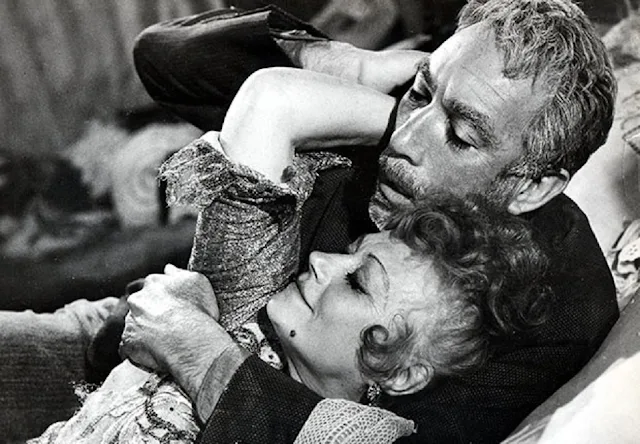 |
| James Bolam, Alan Bates, and Brian Cox in In Celebration |
Cast: Alan Bates, Brian Cox, James Bolam, Constance Chapman, Bill Owen, Gabrielle Daye. Screenplay: David Storey, based on his play. Cinematography: Dick Bush. Art direction: Alan Withy. Film editing: Russell Lloyd. Music: Christopher Gunning.
Upward mobility is not all it's cracked up to be in the Shaw family, the focus of David Storey's play and Lindsay Anderson's film In Celebration. The middle-aged sons of a coal miner have come home to the cramped house where they grew up to celebrate the 40th wedding anniversary of their parents. The oldest, Andrew (Alan Bates), studied the law but has given it up to become an artist. The middle son, Colin (James Bolam), works for an automobile manufacturer as a labor negotiator. And the youngest, Stephen (Brian Cox), is a schoolteacher who has been writing a book but has hit a block. The father (Bill Owen) still works the mines at 64, and the mother (Constance Chapman) keeps a tidy house. You can see where this is going, and it doesn't take long for family secrets and half-buried resentments to surface. D.H. Lawrence and Eugene O'Neill, among others, did this kind of cultural and generational clash with more color and meaning. But this is mostly a vehicle for actors, and we get to watch several very good ones do their thing. Bates, Cox, and Chapman get the roles with more nuance and ambiguity built into them, and
they serve them up well. It's barely a movie rather than a play opened up around the edges, partly because it was part of an experiment called The American Film Theatre, which for a couple of years in the mid 1970s produced adaptations of stage plays shown in selected movie theaters on an advanced sale and subscription basis. The results satisfied neither theatergoers nor movie lovers, but they provide an interesting portrait of the theatrical life of the era and preserve some performances that would otherwise be lost. In this case, it's interesting to see the young Brian Cox after becoming familiar with him as the patriarch on Succession.



_poster.jpg)